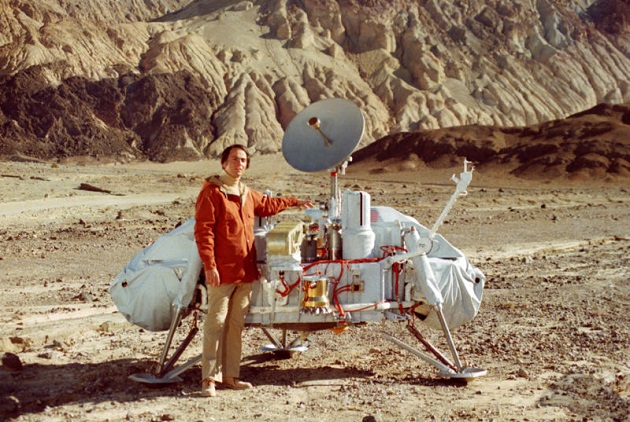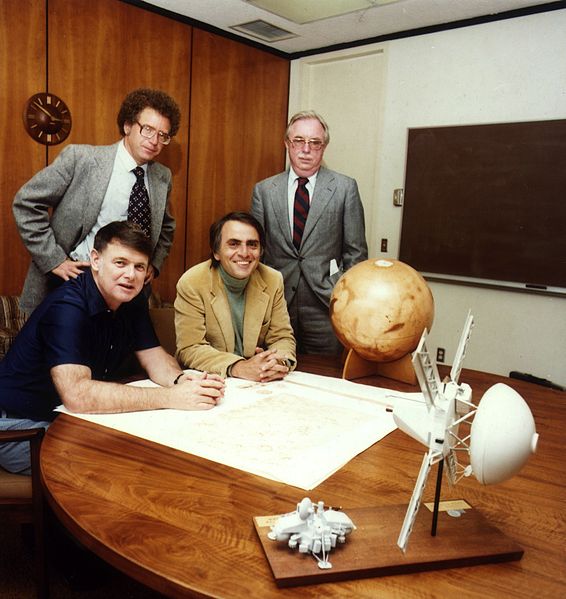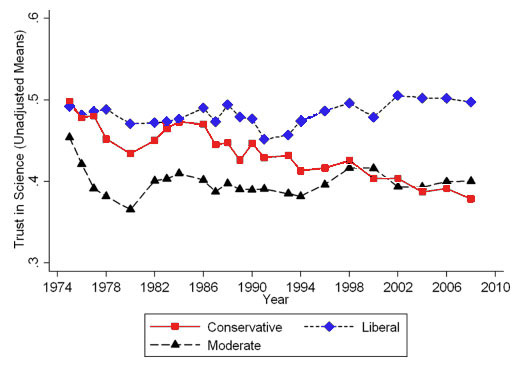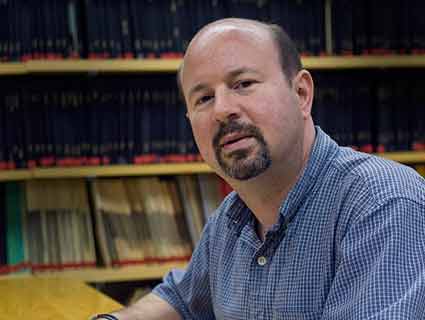
Carl Sagan with a model of the Viking lander. <a href="http://www.nasa.gov/multimedia/imagegallery/image_feature_599.html ">NASA</a>
Yesterday at the Library of Congress, a stunning list of science luminaries—from Bill Nye the Science Guy to Neil deGrasse Tyson to White House science adviser John Holdren—joined one extremely funny science aficionado (Family Guy creator Seth MacFarlane) to celebrate the late astronomer and television star Carl Sagan. The occasion was the opening of the “Seth MacFarlane Collection” of Sagan’s personal papers: 1,705 boxes of Sagan’s letters, notes, and writings now reside at the Library. The event also felt much like a preview of the coming Fox series Cosmos: A SpaceTime Odyssey, a remake of the show that made Sagan famous, that will be hosted by deGrasse Tyson and produced by MacFarlane and Sagan’s widow, Ann Druyan.
One of the leading themes, however, was political. Speaker after speaker used the occasion to lament the way science is treated in the United States today, usually leading with the example of climate change. Science is suffering from “politicization on steroids,” said MacFarlane. “We took a big, big hit when we lost Carl Sagan,” he added later. Holdren remarked that Sagan “would have loved” President Obama’s comment in June that when it comes to climate, “we don’t have time for a meeting of the Flat Earth Society.” Steven Soter, a writer on the original Cosmos series, added that Sagan would have been “appalled” by today’s attacks on climate scientists, and that he would have “deeply altered the landscape” on the climate issue were he still alive.
Sagan died in 1996 after two years of struggling with myelodysplasia, a bone marrow disease. He was 62. During his life, he became the public face of science in the US and around the world thanks to the Emmy-award-winning Cosmos, which first aired on PBS in 1980 to great acclaim. He also published many widely read science books, campaigned for nuclear arms control and space exploration, and was a visionary who not only imagined what life might be like elsewhere in the galaxy but actually endeavored to search for it (a quest embodied in Sagan’s novel Contact)—all the while denouncing UFO aficionados who failed to play by the rules of science and skepticism.
The notion that, today, Sagan would have been deeply engaged with the climate issue is highly plausible. In publicizing the threat of “nuclear winter” in the early 1980s, Sagan was basically outlining the possible consequences of a human-induced climate-alteration (albeit one that would freeze us rather than fry us). In fact, Sagan gained recognition as an astronomer for his research on the greenhouse effect of Venus, work that later inspired NASA climate researcher James Hansen.

And yet it doesn’t take anything away from Sagan’s unrivaled legacy to say that the problems we face today are perhaps too large even for him. The truth is that to celebrate what made Sagan so great and so successful as science’s emissary to the public is to simultaneously realize why the challenges faced by science in the public arena today are so vast and intractable.
David Morrison, a doctoral student of Sagan’s and an astrophysicist who now directs the Carl Sagan Center for Study of Life in the Universe at the SETI Institute, wondered aloud yesterday whether if he were alive today, Sagan would have been much more successful at fighting off nonsense than the rest of us. In answering the question, Morrison observed that in Sagan’s heyday, the days of the Cosmos series, a few networks still dominated television. That meant that when Sagan was on TV (whether on PBS or doing one of his regular guest appearances on The Tonight Show Starring Johnny Carson), your chances were very high of actually seeing him, because there just weren’t many other things to watch. By contrast, when the much-awaited Cosmos sequel airs on Fox, viewers will have the option of flipping to anything from reality cooking shows to paranormal pseudo-documentaries to politicized news.
For a brief trip down memory lane (and to see how science on TV used to look), here’s the opening of the original Cosmos:
According to Fox, Sagan’s Cosmos was ultimately seen by 750 million people. But nobody talking about science today gets the attention of audiences as vast as Sagan’s, due to fundamental changes in the structure of the media.
At the same time, we can also see that some of the battles that Sagan engaged in the 1980s—over Ronald Reagan’s “Star Wars” program and so-called nuclear winter—were dress rehearsals for the intense science politicization over issues like climate change that we live with today. In these conflicts, academic scientists and a few celebrity allies, like Sagan, clashed with conservative scientists affiliated with think tanks like the George C. Marshall Institute, who defended the science behind “Star Wars” and challenged nuclear winter.
That’s still the basic blueprint for how political science conflicts play out, but perhaps as a result of so many of them, political conservatives in the US have grown increasingly distrustful of the scientific community, as documented in a recent study by sociologist Gordon Gauchat. This was not something Sagan had to face. Heading into the 1980s, surveys assessing public trust in science did not show a big difference between left and right:

In other words, Sagan was a science communicator and a science hero in an era in which we weren’t nearly as polarized over science, or sorted into politicized boxes due to our media choices. Today it’s just different, and a whole lot harder. And thus while there is little doubt that Sagan’s “heir apparent” (in MacFarlane’s words), Neil deGrasse Tyson, is at least as talented as Sagan was, the overarching context has changed fundamentally.
The true challenge for science communication and outreach today, accordingly, is to figure out how to counteract these two momentous trends—let’s call them politicization and fragmentation—and bring science to everybody once again.














